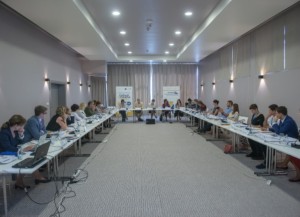The forum ‘Cultural Heritage Works for South East Europe’ took place on 23 September 2015, in Igalo, Montenegro. This event brought together public and civil society stakeholders from the European Union (EU) and South East Europe (SEE) to discuss the real policy momentum for heritage and formulate concrete proposals on the new phase of regional cooperation in this field. The forum was followed by the 12th meeting of the Regional Cooperation Council Task Force on Culture and Society (RCC-TFCS) the next day. On this occasion, the results and recommendations of the ‘Cultural Heritage Counts for Europe’ project were presented. Sneška Quaedvlieg-Mihailović, Secretary General of Europa Nostra, also representing the European Heritage Alliance 3.3., participated in the events.
The forum was opened by: Asja Drača Muntean, TFCS Chair and Assistant Minister of Culture and Information in the Republic of Serbia; Sanjin Arifagić, SEE2020 Coordinator at the Regional Cooperation Council; Wenceslas de Lobkowicz, Advisor at the DG for Neighbourhood and Enlargement Negotiations of the European Commission; and Sneška Quaedvlieg-Mihailović, Secretary General of Europa Nostra and member of the Cultural Heritage Counts for Europe (CHCFE) Steering Committee.
Sneška Quaedvlieg-Mihailović noted the evident policy shifts caused by the increased recognition of the importance, impact and value of cultural heritage in the EU and highlighted the need to include the SEE region in these developments through strengthened participatory approaches. She also underlined the priority of tackling the ongoing refugee crisis in Europe and advocated the crucial role that heritage can play in fostering regional and intercultural dialogue. Finally, the Secretary General of Europa Nostra, also acting on behalf of the European Heritage Alliance 3.3, emphasised the significance of the initiative in organising a European Year of Cultural Heritage in 2018, thus providing a target to aim for to show that cultural heritage indeed works for Europe and SEE.
The meeting featured three thematic panel discussions: Cultural Heritage Counts for (South East) Europe (moderated by Brian Smith, Secretary General of the European Association of Historic Towns and Regions and member of the CHCFE Steering Committee); Participatory governance of cultural heritage in the EU and its implications in SEE (moderated by Sneška Quaedvlieg Mihailović); and Cultural Heritage in SEE: towards a new momentum for regional cooperation (moderated by Wenceslas de Lobkowicz).
“The participants agreed to open a new phase of the Ljubljana Process by reaching out to other stakeholders with a view to building stronger partnerships for the benefit of cultural heritage in South East Europe. This new phase of regional cooperation should duly reflect the recent important EU policy developments which recognise heritage as a strategic resource and a driver of sustainable development in Europe and which promote an integrated approach to cultural heritage at all levels of governance (local, national, regional and European). The focus should be to ensure effective implementation of these newest policy developments throughout the region,” reads the meetings’ Conclusions.
“The Task Force on Culture and Society is encouraged to promote a holistic approach to measuring the impact of cultural heritage and in that respect the key findings and recommendations of the ‘Cultural Heritage Counts for Europe’ report could serve as a useful reference in the longer term. The TFCS is also encouraged to promote the value of and the need for participatory governance in cultural heritage which seeks to ensure the appropriate involvement of all relevant stakeholders, including communities, civil society organisations, research circles and the business sector,” the Conclusions state.
The meeting gathered delegates from the Regional Cooperation Council and the European Commission, TFCS members from Albania, Bosnia and Herzegovina, Croatia, Greece, Kosovo, Moldova, Montenegro and Serbia, and representatives from organisations based in various countries – Albania (Cultural Heritage without Borders), Bosnia and Herzegovina (Balkans Museum Network), Montenegro (Expeditio), the United Kingdom (Heritage Europe and North of England Civil Trust), Romania (Architecture Restoration Archaeology) and Serbia (Europa Nostra Serbia) – the majority of which are also part of Europa Nostra’s network.

